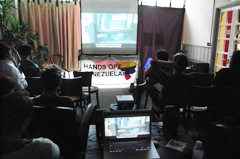HOV Norwich Report: Occupy!
- 24 June 2009
 On Thursday 18th June, Hands Off Venezuela held a public film showing of the new FRETECO film and ‘Sold Out’, a short documentary about the recent occupation of the Visteon plants in Basildon and Enfield.
On Thursday 18th June, Hands Off Venezuela held a public film showing of the new FRETECO film and ‘Sold Out’, a short documentary about the recent occupation of the Visteon plants in Basildon and Enfield.
 On Thursday 18th June, Hands Off Venezuela held a public film showing of the new FRETECO film and ‘Sold Out’, a short documentary about the recent occupation of the Visteon plants in Basildon and Enfield.
On Thursday 18th June, Hands Off Venezuela held a public film showing of the new FRETECO film and ‘Sold Out’, a short documentary about the recent occupation of the Visteon plants in Basildon and Enfield.The meeting was held at the popular Norwich Playhouse and was attended by 20 people. The purpose of the meeting was to engage people in a discussion about worker’s control, which is the essence of the Venezuelan revolution. Hands Off Venezuela has enjoyed a lot of support and sympathy while it has been active in Norwich, but has so far concentrated on political questions, such as whether socialism can be achieved through reformism or revolution.
The two films take the Venezuelan revolution to the level of most people’s daily experience: the workplace. They demonstrate how factory occupations are not a phenomenon confined to South America. The recent experience at Visteon and Lindsey before that have shown that militancy pays. These actions were taken in spite of a right wing trade union leadership that advised its worker’s that the occupation was illegal and that they should leave the premises or face the police.
The level of discussion was very good and raised some very good points. It was pointed out that the experience in Britain had a defensive nature, compared to the Venezuelan example whereby a factory closed is a factory occupied. In Venezuela, the demands go beyond the basic rights of workers and start to question who exactly runs the factories. A debate ensued over why this could be, and it was suggested that occupations in Venezuela were at a much higher stage because workers in Venezuela have had to face organised scarcity, whereby bosses effectively leave their factories standing idle. For example, milk production in Venezuela has been completely sabotaged by the oligarchy. These conditions of scarcity have forced workers to take over the running of the factories themselves, producing for need rather than for profit, as best seen in the valve producing plant Inveval.
The role of the union during the Visteon dispute was also discussed, where we all agreed that the unions in Britain are too conciliatory, and must change in the coming period if worker’s are to effectively fight against attacks on their working conditions.
The meeting was great success and puts Hands Off Venezuela in a strong position for next year. It has already been suggested by a number of people that the films are shown at the University of East Anglia. The experience in Venezuela is a striking lesson for worker’s in Britain who can follow its examples when they come under attack from their bosses.

 Please help build the campaign by
Please help build the campaign by